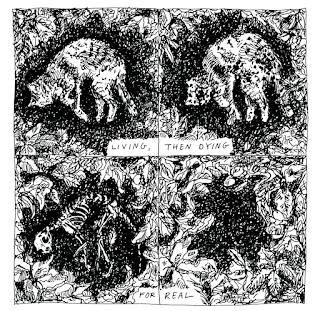There's also a different crisis: not just the worry about oblivion after death, but about not being recognized or seen while they are alive--especially by family. This is heart-rendingly illustrated by the narrator's figure disappearing in the second panel of a four-panel grid, then the entirety of their environment unraveling. The story ends with a defiant assertion of identity and existence, even if the possibility of acknowledgment and connection is unclear. The vulnerability of this exploration is well-matched by the quavering quality of the line.
Patches, by Rachel Bivens. This is a romance comic in the truest and best sense of the word. Structurally speaking, there are usually two kinds of romance comics: one where the protagonist is lonely and seeks out a partner, or one where the protagonist is partnered but encounters some kind of problem. That second type can be a bit more complex, because their motivations can vary a lot more. Bivens' Patches falls into that second category, as Kristy has a beautiful girlfriend named Jordan but is perpetually obsessed with her own acne. Jordan is loving and accepting of her girlfriend, so that's not the conflict. Rather, the conflict is Kristy's own sense of self, measured up against someone she sees as perfect.
The conflict is mediated by Brandi, Kristy's best friend, who tries to support her but is tired of Kristy's self-obsession making them late for class and essentially sucking all of the oxygen out of the room. That kind of body dysmorphia can't be reasoned or reassured away, but it's also something that destroys boundaries and ruins friendships if left unchecked. Bivens doesn't need to introduce an artificial misunderstanding or other conflict; this one, and Kristy's obsession with applying decorative "patches" to her acne, is plenty. There's a gentleness to Bivens' work here, as the conflict is resolved in a humane and believable manner, even as no easy solutions are proffered. The cute line that is heavy on facial expressions soaks up the bright but not overly vivid color palette.






No comments:
Post a Comment